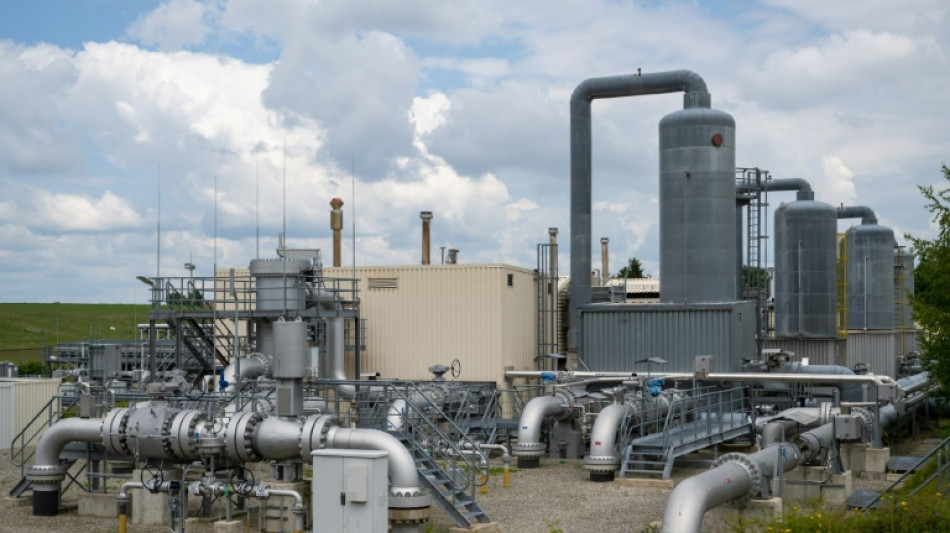
-
 India-Pakistan gunfire triggers terror of past conflict
India-Pakistan gunfire triggers terror of past conflict
-
UK hard right sets sights high after local election triumphs

-
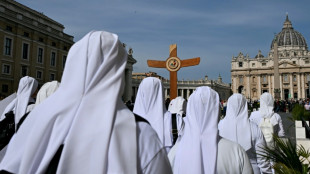 Sexual abuse of nuns: one of the Catholic Church's last taboos
Sexual abuse of nuns: one of the Catholic Church's last taboos
-
West German foothold of far-right AfD shows challenge for Merz
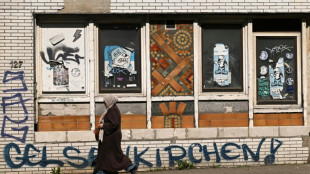
-
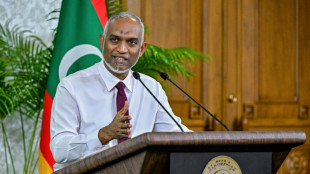 Maldives president holds record 15-hour press conference
Maldives president holds record 15-hour press conference
-
'Accept me': Near Ukraine front, a haven for outcasts
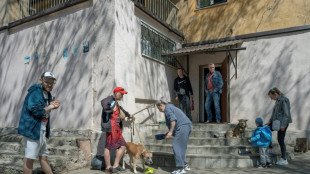
-
 Canelo Alvarez unifies super middleweight titles on Saudi Arabia debut
Canelo Alvarez unifies super middleweight titles on Saudi Arabia debut
-
Canelo Alvarez unifes super middleweight titles on Saudi Arabia debut

-
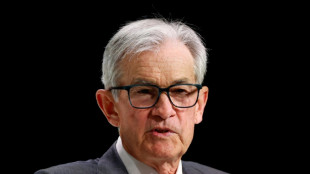 US Fed expected to pause cuts again and wait for clarity on tariffs
US Fed expected to pause cuts again and wait for clarity on tariffs
-
Ex-Liverpool star Firmino 'proud' after more Champions League history

-
 Australian PM basks in win, vows 'orderly' government
Australian PM basks in win, vows 'orderly' government
-
Qataris hooked on traditional fishing competition
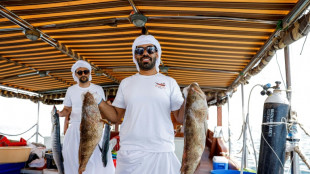
-
 Mozart chocolate row leaves bitter taste in Austria
Mozart chocolate row leaves bitter taste in Austria
-
US solar tariffs could drive Asia transition boom

-
 Four-try Hurricane Sullivan says revenge fuelled Chiefs upset
Four-try Hurricane Sullivan says revenge fuelled Chiefs upset
-
Nuggets rout Clippers to advance in NBA playoffs

-
 Scheffler shines in dark for eight-shot CJ Cup Byron Nelson lead
Scheffler shines in dark for eight-shot CJ Cup Byron Nelson lead
-
Romania returns to polls after annulled presidential vote
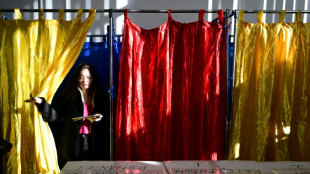
-
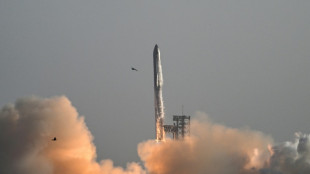 Easy vote turns Musk's dreams for Starbase city in Texas into reality
Easy vote turns Musk's dreams for Starbase city in Texas into reality
-
Messi and Miami bounce back with 4-1 crushing of Red Bulls

-
 US researchers seek to legitimize AI mental health care
US researchers seek to legitimize AI mental health care
-
Ryu clings to two-shot lead at LPGA Black Desert Championship

-
 Ledecky, Walsh cap Pro Swim meet with world records
Ledecky, Walsh cap Pro Swim meet with world records
-
Sovereignty rules in 151st Kentucky Derby

-
 McLaughlin-Levrone sets world's fastest of year in 400m hurdles
McLaughlin-Levrone sets world's fastest of year in 400m hurdles
-
Sovereignty wins 151st Kentucky Derby

-
 US swim star Ledecky smashes her longstanding 800m freestyle world record
US swim star Ledecky smashes her longstanding 800m freestyle world record
-
Antonelli's teenage pace impresses Verstappen

-
 From stronghold guarded by backers, Bolivia ex-leader plots return
From stronghold guarded by backers, Bolivia ex-leader plots return
-
Barca stay on Liga title track with Valladolid comeback

-
 Israel calls up tens of thousands of reservists for Gaza offensive
Israel calls up tens of thousands of reservists for Gaza offensive
-
Verstappen takes pole position for Miami Grand Prix

-
 Williams beats Trump to set up World Snooker final with Zhao
Williams beats Trump to set up World Snooker final with Zhao
-
Warren Buffett to retire from Berkshire Hathaway by year's end

-
 Barca battle back at Valladolid to preserve Liga title charge
Barca battle back at Valladolid to preserve Liga title charge
-
'Like a dream' says dominant Sabalenka after third Madrid title

-
 Napoli move step closer to Serie A crown after win at fiery Lecce
Napoli move step closer to Serie A crown after win at fiery Lecce
-
Williams beats Trump to set up World Snooker final with Zhao Xintong

-
 Eurovision limbers up with over-60s disco
Eurovision limbers up with over-60s disco
-
'Surreal' Freeman hat-trick stuns Leinster to take Northampton into Champions Cup final

-
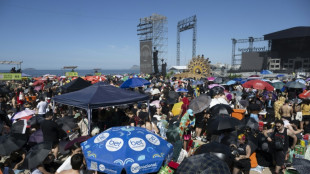 Huge crowds head to Copacabana for free Lady Gaga concert
Huge crowds head to Copacabana for free Lady Gaga concert
-
Warren Buffett: billionaire investor with simple tastes
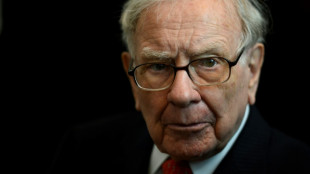
-
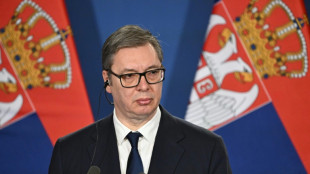 Serbian president out of hospital after cutting short US trip
Serbian president out of hospital after cutting short US trip
-
Arsenal rocked by Bournemouth, Villa boost top five bid

-
 Freeman hat-trick stuns Leinster to take Northampton into Champions Cup final
Freeman hat-trick stuns Leinster to take Northampton into Champions Cup final
-
Warren Buffett says will retire from Berkshire Hathaway by year's end

-
 Al Ahli beat Kawasaki Frontale to win Asian Champions League
Al Ahli beat Kawasaki Frontale to win Asian Champions League
-
Shepherd, Dayal edge Bengaluru past Chennai in IPL thriller

-
 Sabalenka beats Gauff to win third Madrid Open crown
Sabalenka beats Gauff to win third Madrid Open crown
-
Arsenal suffer Bournemouth defeat ahead of PSG showdown


Germany races to stockpile gas before winter
Germany's race to wean itself off Russian energy and stockpile enough gas before winter is playing out largely hidden from view, some 1,600 metres (one mile) below ground in the foothills of the Bavarian Alps.
Surrounded by rolling farmland near the banks of the river Inn, the former Bierwang natural gas field in Unterreit serves as one of Germany's largest underground gas storage facilities.
Run by German operator Uniper, Bierwang can hold more than 800 million cubic metres of gas -- enough to power the nearby city of Munich for eight months.
Like other storage sites, Bierwang replenishes its stocks between winters, to keep homes heated and Germany's energy-hungry industry humming during the cold months when demand is highest.
But this year, the stakes are higher than ever.
With the war in Ukraine raging and Moscow increasingly seen as an unreliable supplier, governments across Europe are scrambling to store supplies before Moscow decides to reduce the flow of gas, or close the taps altogether.
"The security of supply this winter will depend on two factors: how full the storage facilities are and how much new gas keeps arriving" from abroad, said Sebastian Herold, a professor of energy economics at the Darmstadt University of Applied Sciences.
Russian deliveries will play a "decisive role" in this, Herold said.
Efforts by successive German governments to build closer economic ties with Moscow have left the country hooked on Russian energy imports, a policy now widely seen as misguided.
- Injected into rock -
Fears that a sudden shortage of Russian gas could bring Europe's biggest economy to its knees recently prompted the German government to adopt legislation requiring all of the nation's gas reservoirs to be 90 percent full by November.
Altogether, the above and underground sites have enough capacity to cover 25 percent of Germany's natural gas consumption. They act as a kind of buffer in times of strain on the gas market or if demand spikes during unusually cold weather.
As part of Western sanctions against Moscow, Germany has already agreed to phase out Russian oil and coal. But becoming independent of Russian gas will take longer -- and it won't come cheap as the war in Ukraine sends energy prices soaring.
So far, Berlin has managed to reduce the share of its natural gas supplied by Russia from 55 percent before the invasion, to 35 percent now thanks to increased deliveries from countries like Norway and the Netherlands, and through liquefied natural gas contracts (LNG).
In Bierwang, a network of long-distance pipelines delivers gas to the storage facility. The gas is then compressed before being injected into porous sandstone and stored in natural reservoirs deep below ground.
This method allows vast quantities of natural gas to be stockpiled, but the filling and emptying takes longer than with a second type of underground storage that relies on large caverns in rock salt formations, more commonly found in northern Germany.
"We're on a good way to hopefully deliver the security supply this winter," said Doug Waters, managing director of Uniper Energy Storage, which operates nine storage facilities in Germany.
- Ex-Gazprom unit -
Germany's gas storage sites were 55 percent full on Tuesday, according to the German Federal Network Agency, which posts daily updates online.
The current fill rate is "better than in previous years, but still not sufficient," said the agency's head, Klaus Mueller.
Complicating Germany's challenge to get ready for winter is the situation at the crucial Rehden gas storage facility in the north, the largest in the country.
The German state temporarily took control of the site's owner, Gazprom Germania, in April, a move Berlin said was necessary to ensure energy security as ties with Russia worsened.
Berlin suspects that the unit's former owner, Russia's state-owned Gazprom, deliberately kept supplies low before the invasion of Ukraine to give it leverage over Germany.
Russia last month cut off supplies to Gazprom Germania in retaliation for Berlin's move.
The Rehden facility, with a gas storage capacity of four billion cubic metres, was just 7.95 percent full on Tuesday.
P.Stevenson--AMWN